Ansible - AWS Auto Scaling via AMI

Ansible 2.0
We're going to create an instance via AMI with Auto Scaling group. We'll use Ansible Dynamic Inventory.
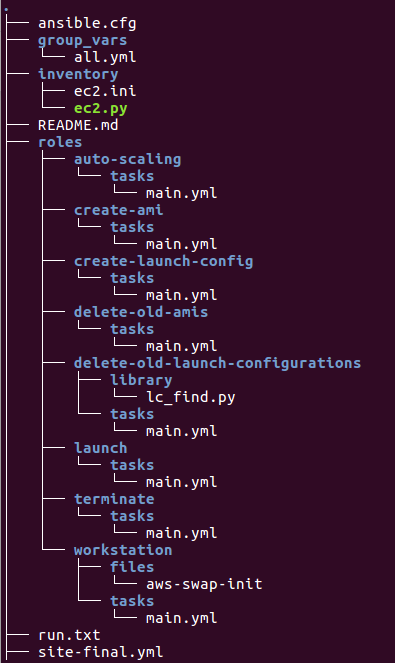
Requirements (on host that executes module):
- python >= 2.6
- boto - Ansible's EC2 module uses python-boto library to call AWS API, and boto needs AWS credentials in order to function. So we need the boto installed on our local host.
Though there are many ways to set our AWS credentials, in this tutorial, we'll create a file under our user home folder (~/.boto):
[Credentials] AWS_ACCESS_KEY_ID=KID...CWU AWS_SECRET_ACCESS_EY=3qv...DSP
We need to create:
- An IAM group with "AdministratorAccess" and "IAMFullAccess" privileges, we named it "PowerUsers".
- We need to create an IAM policy that gives zero access to any of our resources. The reason for this is that we'll be provisioning EC2 instances with an IAM policy attached, and if those instances get compromised, we don't want them to have permission to make any changes to our AWS account.
In our case, we named the role as 'noaccess' which will be specified in "group_vars/all.yml".iam_profile: "noaccess"
The policy should look like this:
{ "Version": "2012-10-17", "Statement": [ { "Action": "*", "Effect": "Deny", "Resource": "*" } ] }
We can check it by clicking on the "Show Policy" action for the "IAMFullAccess" policy.
- Create a keypair, "autoscaling":
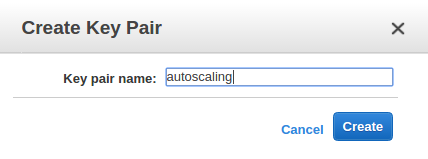
The private key will now be downloaded by browser. Save the key in ~/.ssh folder:$ mv autoscaling.pem ~/.ssh $ chmod 600 ~/.ssh/autoscaling.pem
Add the private key to ssh-agent by executing the following commands:$ eval `ssh-agent` $ ssh-add ~/.ssh/autoscaling.pem
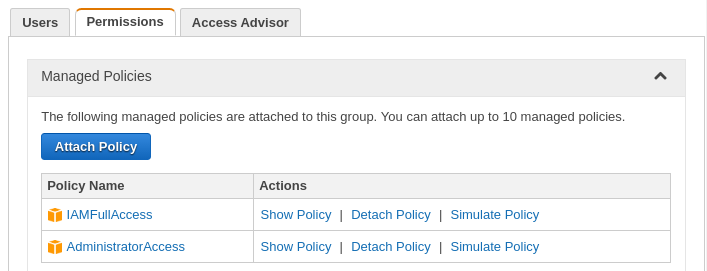
Ansible uses inventory information about hosts and groups of hosts to connect to and manage client devices. By default, inventory information is stored in /etc/ansible/hosts. This inventory information can also be expanded to include the 'group_vars' and 'host_vars' directories.
Now managing a large flat file can be unwieldy. If we are frequently adding and removing devices, then keeping the inventory current might be problematic and time consuming. Additionally, we might be duplicating information that is stored in an alternate system.
Ansible has an alternate way of managing inventory called dynamic inventory. Basically, what we can do is pass in an alternate inventory source using the '-i' option.
In order for this to work properly, we need to setup the EC2 external inventory script in our playbook.
$ mkdir -p ~/bogo/inventory $ cd ~/bogo/inventory
To get started with dynamic inventory management, we'll need to grab the EC2.py script and the EC2.ini config file. The EC2.py script is written using the Boto EC2 library and will query AWS for our running Amazon EC2 instances. The EC2.ini file is the config file for EC2.py, and can be used to limit the scope of Ansible's reach. We can specify the regions, instance tags, or roles that the EC2.py script will find.
Let's download the EC2 external inventory script from Ansible:
$ wget https://raw.githubusercontent.com/ansible/ansible/devel/contrib/inventory/ec2.py $ wget https://raw.githubusercontent.com/ansible/ansible/devel/contrib/inventory/ec2.ini $ chmod +x ec2.py
Next, create the default Ansible configuration for this playbook by editing a file in the root of the playbook directory (in our example, ~/bogo), named ansible.cfg. This file should have the following text in it:
[defaults] remote_user = ubuntu host_key_checking = False inventory = ./inventory/ec2.py [ssh_connection] control_path = %(directory)s/%%C
To test and ensure that this script is working properly (and that your boto credentials are setup properly), execute the following command:
$ ~/bogo/inventory/ec2.py --list
We should see the following output:
{
"_meta": {
"hostvars": {}
}
}
The following group variables will apply to any tasks configured in our playbook which allow us to specify a default set that will work for our provisioning:
---
# group_vars/all.yml
region: us-east-1
zone: us-east-1a # zone that the master AMI will be configured in
keypair: immutable
security_groups: ['default']
instance_type: t2.nano
# specify group_name on the command line with -e group_name=devX
group_name: test
instances_min: 1 # minimum number of instances in the auto scaling group
instances_max: 1 # maximum number of instances in the auto scaling group
iam_profile: "noaccess"
volumes:
- device_name: /dev/sda1
device_type: gp2
volume_size: 8 # size of the root disk
delete_on_termination: true
Roles are used to automatically load certain variables and tasks into an Ansible playbook, and allow us to reuse our tasks in a modular way.
The launch role launches a new EC2 compute instance, in the region and availability zone specified in our "group_vars" file:
---
# roles/launch/tasks/main.yml
- name: Search for the latest Ubuntu 14.04 AMI
ec2_ami_find:
region: "{{ region }}"
name: "ubuntu/images/hvm-ssd/ubuntu-trusty-14.04-amd64-server-*"
owner: 099720109477
sort: name
sort_order: descending
sort_end: 1
no_result_action: fail
register: ami_result
- name: Launch new instance
ec2:
region: "{{ region }}"
keypair: "{{ keypair }}"
zone: "{{ zone }}"
group: "{{ security_groups }}"
image: "{{ ami_result.results[0].ami_id }}"
instance_type: "{{ instance_type }}"
instance_tags:
Name: "{{ name }}"
volumes: "{{ volumes }}"
wait: yes
register: ec2
- name: Add new instances to host group
add_host:
name: "{{ item.public_dns_name }}"
groups: "{{ name }}"
ec2_id: "{{ item.id }}"
with_items: ec2.instances
- name: Wait for instance to boot
wait_for:
host: "{{ item.public_dns_name }}"
port: 22
delay: 30
timeout: 300
state: started
with_items: ec2.instances
Now that we have a role that can launch a brand new t2.nano instance, our next role will allow us to configure this instance to be used as a workstation.
roles/workstation/tasks/main.yml:
---
# roles/workstation/tasks/main.yml
- name: add timezone configuration
command: bash -c 'echo US/Eastern > /etc/timezone'
- name: add kernel parameters to /etc/sysctl.d/60-custom.conf
blockinfile: |
dest=/etc/sysctl.d/60-custom.conf
create=yes
content="# Auto-reboot linux 10 seconds after a kernel panic
kernel.panic = 10
kernel.panic_on_oops = 10
kernel.unknown_nmi_panic = 10
kernel.panic_on_unrecovered_nmi = 10
kernel.panic_on_io_nmi = 10
# Controls whether core dumps will append the PID to the core filename, useful for debugging multi-threaded applications
kernel.core_uses_pid = 1
# Turn on address space randomization - security is super important
kernel.randomize_va_space = 2
vm.swappiness = 0
vm.dirty_ratio = 80
vm.dirty_background_ratio = 5
vm.dirty_expire_centisecs = 12000
vm.overcommit_memory = 1
# ------ VM ------
fs.file-max = 204708
#fs.epoll.max_user_instances = 4096
fs.suid_dumpable = 0
# ------ NETWORK SECURITY ------
# Turn on protection for bad icmp error messages
net.ipv4.icmp_ignore_bogus_error_responses = 1
# Turn on syncookies for SYN flood attack protection
net.ipv4.tcp_syncookies = 1
net.ipv4.tcp_max_syn_backlog = 8096
net.ipv4.tcp_synack_retries = 2
net.ipv4.tcp_syn_retries = 2
# Log suspicious packets, such as spoofed, source-routed, and redirect
net.ipv4.conf.all.log_martians = 1
net.ipv4.conf.default.log_martians = 1
# Disables these ipv4 features, not very legitimate uses
net.ipv4.conf.all.accept_source_route = 0
net.ipv4.conf.default.accept_source_route = 0
# ------ NETWORK PERFORMANCE ------
# Netflix 2014 recommendations
net.core.netdev_max_backlog = 5000
net.core.rmem_max = 16777216
net.core.wmem_max = 16777216
net.ipv4.tcp_wmem = 4096 12582912 16777216
net.ipv4.tcp_rmem = 4096 12582912 16777216
# Allow reusing sockets in TIME_WAIT state for new connections
net.ipv4.tcp_tw_reuse = 1
# Socket max connections waiting to get accepted; the listen() backlog.
# Default is 128.
net.core.somaxconn = 4096
# Decrease fin timeout. After telling the client we are closing, how long to wait for a FIN, ACK?
# Default is 60.
net.ipv4.tcp_fin_timeout = 10
# Avoid falling back to slow start after a connection goes idle
# keeps our cwnd large with the keep alive connections
net.ipv4.tcp_slow_start_after_idle = 0"
- name: reload sysctl kernel parameter settings
command: bash -c 'sysctl -p /etc/sysctl.d/60-custom.conf'
- name: copy swapfile init script
copy: src=aws-swap-init dest=/etc/init.d/aws-swap-init mode=0755
- name: register swapfile init script
command: bash -c 'update-rc.d aws-swap-init defaults'
- name: add entries to sudoers
lineinfile: |
dest=/etc/sudoers.d/90-cloud-init-users
line="luke ALL=(ALL) NOPASSWD:ALL"
- name: add luke user account
user: name=luke uid=1001 comment="Luke Youngblood" createhome=yes shell=/bin/bash
- name: accept Oracle license part 1
command: bash -c 'echo debconf shared/accepted-oracle-license-v1-1 select true | /usr/bin/debconf-set-selections'
- name: accept Oracle license part 2
command: bash -c 'echo debconf shared/accepted-oracle-license-v1-1 seen true | /usr/bin/debconf-set-selections'
- name: Update apt cache
apt: update_cache=yes
- name: Add apt key for ubuntu
apt_key: keyserver=keyserver.ubuntu.com id=E56151BF
- name: Determine Linux distribution distributor
shell: lsb_release -is | tr ''[:upper:]'' ''[:lower:]''
register: release_distributor
- name: Determine Linux distribution codename
command: lsb_release -cs
register: release_codename
- name: Add Mesosphere repository to sources list
lineinfile: >
dest=/etc/apt/sources.list.d/mesosphere.list
line="deb http://repos.mesosphere.io/{{ release_distributor.stdout }} {{ release_codename.stdout }} main"
mode=0644
create=yes
- name: Add java apt repository
apt_repository: repo='ppa:webupd8team/java'
- name: Add Google Chrome key
shell: wget -q -O - https://dl-ssl.google.com/linux/linux_signing_key.pub | apt-key add -
- name: Add Google Chrome repo
copy: >
content="deb http://dl.google.com/linux/chrome/deb/ stable main"
dest="/etc/apt/sources.list.d/google-chrome.list"
owner=root
group=root
mode=0644
- name: Update apt cache
apt: update_cache=yes
- name: Install packages
apt: pkg={{ item }} state=installed
with_items:
- nfs-common
- oracle-java8-installer
- liblapack-dev
- libblas-dev
- gfortran
- ntp
- vnc4server
- xfce4
- xfce4-goodies
- emacs
- firefox
- git
- maven
- npm
- python-pip
- clusterssh
- graphviz
- google-chrome-stable
- python-numpy
- python-scipy
- python-dev
- python-nose
- g++
- libopenblas-dev
- name: Install boto and run setup
command: bash -c 'git clone git://github.com/boto/boto.git;cd /home/ubuntu/boto;python setup.py install'
args:
chdir: /home/ubuntu
- name: Install bower
command: bash -c 'npm install -g bower'
- name: Update all packages to the latest version
apt: upgrade=dist
- name: Create nodejs symlink
file: src=/usr/bin/nodejs dest=/usr/bin/node state=link
- name: execute dpkg-reconfigure
command: "dpkg-reconfigure -f noninteractive tzdata"
Note that it takes a while doing all tasks. So, we may want to comment out majority of the task if we just want to know how we do Auto Scaling!
roles/workstation/files/aws-swap-init:
#!/bin/sh
#
# aws-swap-init
#
DEFAULTSIZE=4194304
start () {
# Check to see if there is swap mounted right now
# If there is, we're done here
ISSWAP=`/bin/cat /proc/meminfo | /bin/grep SwapTotal | /usr/bin/awk '{print $2}'`
if [ $ISSWAP -ne 0 ]
then
exit 0
fi
# What OS are we running?
if [ -f /etc/system-release -o -f /etc/redhat-release ]
then
OSTYPE="amzn"
elif [ -f /etc/lsb-release ]
then
OSTYPE="ubuntu"
fi
# Set the target directory. If unsupported platform, use root
case "$OSTYPE" in
amzn)
TARGET="/media/ephemeral0"
;;
ubuntu)
TARGET="/mnt"
;;
*)
TARGET="/"
;;
esac
# Does a swapfile already exist? If so, activate and be done
if [ -f $TARGET/swapfile00 ]
then
/sbin/swapon $TARGET/swapfile00
exit 0
fi
# OK, so there's no existing swapfile. Let's make one and activate it.
# If we're on an unsupported OS, or ephemeral disk isn't mounted, use a safe
# default size. Otherwise, use RAM size
if [ $TARGET = "/" ]
then
SIZE=$DEFAULTSIZE
else
/bin/mount | grep -q " on $TARGET type "
if [ $? -eq 0 ]
then
SIZE=`/bin/cat /proc/meminfo | /bin/grep "^MemTotal" | /usr/bin/awk '{print $2}'`
else
SIZE=$DEFAULTSIZE
TARGET="/"
fi
fi
# OK, time to get down to business.
/bin/dd if=/dev/zero of=$TARGET/swapfile00 bs=1024 count=$SIZE
/sbin/mkswap $TARGET/swapfile00
/sbin/swapon $TARGET/swapfile00
}
stop () {
exit 0
}
case "$1" in
start)
$1
;;
stop)
$1
;;
*)
echo $"Usage: $0 {start|stop}"
exit 2
esac
exit $?
Here is our playbook to deploy the workstation:
site.yml:
---
# deployworkstation.yml
- hosts: localhost
connection: local
gather_facts: no
roles:
- role: launch
name: "{{ group_name }}amibuild"
- hosts: "{{ group_name }}amibuild"
become: True
become_user: root
become_method: sudo
roles:
- workstation
To test:
$ ansible-playbook -vv -e group_name=test site.yml --private_key=/home/k/.ssh/einsteinish.pem
We should see the following output at the end of the playbook run:
PLAY RECAP ********************************************************************* ec2-34-206-52-93.compute-1.amazonaws.com : ok=25 changed=22 unreachable=0 failed=0 localhost : ok=4 changed=2 unreachable=0 failed=0
To make it sure, let's ssh to the instance:
Now, we're going to create an AMI (Amazon Machine Image) out of our workstation after it's configured, then create a launch configuration pointing at that AMI. Then, we'll create an autoscaling group that points at the launch configuration.
After our workstation role has fully configured the instance, we are going to add a role to create an AMI by snapshotting our running instance.
roles/create-ami/tasks/main.yml:
---
# roles/create-ami/tasks/main.yml
- name: Create AMI
ec2_ami:
region: "{{ region }}"
instance_id: "{{ ec2.instance_ids[0] }}"
name: "{{ asg_name }}-{{ ansible_date_time.iso8601 | regex_replace('[^a-zA-Z0-9]', '-') }}"
wait: yes
wait_timeout: 1200
state: present
register: ami
The following create-launch-config role allow us to create a launch configuration that points at the AMI we just created. This is a necessary before we can create the autoscaling group.
roles/create-launch-config/tasks/main.yml:
---
# roles/create-launch-config/tasks/main.yml
- name: Create Launch Configuration
ec2_lc:
region: "{{ region }}"
name: "{{ asg_name }}-{{ ansible_date_time.iso8601 | regex_replace('[^a-zA-Z0-9]', '-') }}"
image_id: "{{ ami.image_id }}"
key_name: "{{ keypair }}"
instance_type: "{{ instance_type }}"
instance_profile_name: "{{ iam_profile }}"
security_groups: "{{ security_groups }}"
volumes: "{{ volumes }}"
instance_monitoring: yes
register: lc_result
- debug: var=lc_result
First, we'll create a launch configuration that points at the AMI we just created. This is a necessary before we can create the autoscaling group.
Then, we're going to create is the role that actually creates the autoscaling group.
This role first checks to see if an Auto Scaling group with the same name already exists, and if so, it just updates it.
By updating the Auto Scaling group to point at the new launch configuration, with a new AMI, the Auto Scaling group will automatically do a rolling upgrade, where it starts a new instance, waits until the OS is loaded and healthy, then terminates an old instance. It repeats this process until all instances in the Auto Scaling group are running the new AMI.
We can configure this by changing replace_batch_size, however, we've set a sensible default based on the size of the group divided by 4. For example, if you had an Auto Scaling group with 8 running instances, Auto Scaling would deploy 2 new instances at once, to speed up the rolling upgrade process.
roles/auto-scaling/tasks/main.yml:
---
# roles/auto-scaling/tasks/main.yml
- name: Create Launch Configuration
ec2_lc:
region: "{{ region }}"
name: "{{ asg_name }}-{{ ansible_date_time.iso8601 | regex_replace('[^a-zA-Z0-9]', '-') }}"
image_id: "{{ ami.image_id }}"
key_name: "{{ keypair }}"
instance_type: "{{ instance_type }}"
instance_profile_name: "{{ iam_profile }}"
security_groups: "{{ security_groups }}"
volumes: "{{ volumes }}"
instance_monitoring: yes
register: lc_result
- name: Retrieve current Auto Scaling Group properties
command: "aws --region {{ region }} autoscaling describe-auto-scaling-groups --auto-scaling-group-names {{ asg_name }}"
register: asg_properties_result
- name: Set asg_properties variable from JSON output if the Auto Scaling Group already exists
set_fact:
asg_properties: "{{ (asg_properties_result.stdout | from_json).AutoScalingGroups[0] }}"
when: (asg_properties_result.stdout | from_json).AutoScalingGroups | count
- name: Configure Auto Scaling Group and perform rolling deploy
ec2_asg:
region: "{{ region }}"
name: "{{ asg_name }}"
launch_config_name: "{{ lc_result.name }}"
availability_zones: "{{ zone }}"
health_check_type: EC2
health_check_period: 300
# desired_capacity: "{{ asg_properties_result.DesiredCapacity | default(2) }}"
desired_capacity: "{{ instances_min }}"
replace_all_instances: yes
replace_batch_size: "{{ (asg_properties_result.DesiredCapacity | default(2) / 4) | round(0, 'ceil') | int }}"
min_size: "{{ instances_min }}"
max_size: "{{ instances_max }}"
tags:
- Name: "{{ asg_name }}"
# load_balancers:
# - master
state: present
register: asg_result
- debug: var=asg_result
- name: Configure Scaling Policies
ec2_scaling_policy:
region: "{{ region }}"
name: "{{ item.name }}"
asg_name: "{{ asg_name }}"
state: present
adjustment_type: "{{ item.adjustment_type }}"
min_adjustment_step: "{{ item.min_adjustment_step }}"
scaling_adjustment: "{{ item.scaling_adjustment }}"
cooldown: "{{ item.cooldown }}"
with_items:
- name: "Increase Group Size"
adjustment_type: "ChangeInCapacity"
scaling_adjustment: +1
min_adjustment_step: 1
cooldown: 180
- name: "Decrease Group Size"
adjustment_type: "ChangeInCapacity"
scaling_adjustment: -1
min_adjustment_step: 1
cooldown: 300
register: sp_result
- name: Determine Metric Alarm configuration
set_fact:
metric_alarms:
- name: "{{ asg_result.name }}-ScaleUp"
comparison: ">="
threshold: 50.0
alarm_actions:
- "{{ sp_result.results[0].arn }}"
- name: "{{ asg_result.name }}-ScaleDown"
comparison: "<="
threshold: 20.0
alarm_actions:
- "{{ sp_result.results[1].arn }}"
- name: Configure Metric Alarms and link to Scaling Policies
ec2_metric_alarm:
region: "{{ region }}"
name: "{{ item.name }}"
state: present
metric: "CPUUtilization"
namespace: "AWS/EC2"
statistic: "Average"
comparison: "{{ item.comparison }}"
threshold: "{{ item.threshold }}"
period: 60
evaluation_periods: 5
unit: "Percent"
dimensions:
AutoScalingGroupName: "{{ asg_result.name }}"
alarm_actions: "{{ item.alarm_actions }}"
with_items: metric_alarms
when: "{{ asg_result.max_size }} > 1"
register: ma_result
If it's creating a new Auto Scaling group, it also sets some CloudWatch metric alarms based on CPU utilization, and links the metric alarms to the scaling policies. The way we set these alarms, if average CPU utilization is greater than 50% for 5 minutes, the group will scale up by adding another instance. If average CPU utilization is less than 20% for 5 minutes, the group will scale down by terminating an instance.
There are also some cooldown times set so that this doesn't happen too often; scaling up can only happen every 3 minutes, and scaling down can only happen every 5 minutes.
Here is our updated deploy play located in the root of our playbook folder. This new site_final.yml play should look like this:
---
# site-final.yml
- hosts: localhost
connection: local
gather_facts: no
roles:
- role: launch
name: "{{ group_name }}amibuild"
- hosts: "{{ group_name }}amibuild"
become: True
become_user: root
become_method: sudo
roles:
- workstation
- hosts: localhost
connection: local
gather_facts: no
roles:
- { role: create-ami, asg_name: "{{ group_name }}" }
- { role: create-launch-config, asg_name: "{{ group_name }}" }
- { role: auto-scaling, asg_name: "{{ group_name }}", instances_max: 1 }
#- hosts: localhost
# connection: local
# gather_facts: no
# roles:
# - { role: delete-old-launch-configurations, asg_name: "{{ group_name }}" }
# - { role: delete-old-amis, asg_name: "{{ group_name }}" }
#- hosts: "{{ group_name }}amibuild"
# connection: local
# gather_facts: no
# roles:
# - terminate
Here is the file (roles/delete-old-launch-configurations/tasks/main.yml):
---
# roles/delete-old-launch-configurations/tasks/main.yml
- lc_find:
region: "{{ region }}"
name_regex: "{{ asg_name }}-.*"
sort: yes
sort_end: -5
register: old_lc_result
- ec2_lc:
region: "{{ region }}"
name: "{{ item.name }}"
state: absent
with_items: old_lc_result.results
ignore_errors: yes
This role also requires a python script (roles/delete-old-launch-configurations/library/lc_find.py):
#!/usr/bin/python
# roles/delete-old-launch-configurations/library/lc_find.py
import json
import subprocess
def main():
argument_spec = ec2_argument_spec()
argument_spec.update(dict(
region = dict(required=True,
aliases = ['aws_region', 'ec2_region']),
name_regex = dict(required=False),
sort = dict(required=False, default=None, type='bool'),
sort_order = dict(required=False, default='ascending',
choices=['ascending', 'descending']),
sort_start = dict(required=False),
sort_end = dict(required=False),
)
)
module = AnsibleModule(
argument_spec=argument_spec,
)
name_regex = module.params.get('name_regex')
sort = module.params.get('sort')
sort_order = module.params.get('sort_order')
sort_start = module.params.get('sort_start')
sort_end = module.params.get('sort_end')
lc_cmd_result = subprocess.check_output(["aws", "autoscaling", "describe-launch-configurations", "--region", module.params.get('region')])
lc_result = json.loads(lc_cmd_result)
results = []
for lc in lc_result['LaunchConfigurations']:
data = {
'arn': lc["LaunchConfigurationARN"],
'name': lc["LaunchConfigurationName"],
}
results.append(data)
if name_regex:
regex = re.compile(name_regex)
results = [result for result in results if regex.match(result['name'])]
if sort:
results.sort(key=lambda e: e['name'], reverse=(sort_order=='descending'))
try:
if sort and sort_start and sort_end:
results = results[int(sort_start):int(sort_end)]
elif sort and sort_start:
results = results[int(sort_start):]
elif sort and sort_end:
results = results[:int(sort_end)]
except TypeError:
module.fail_json(msg="Please supply numeric values for sort_start and/or sort_end")
module.exit_json(results=results)
from ansible.module_utils.basic import *
from ansible.module_utils.ec2 import *
if __name__ == '__main__':
main()
This role simply deletes any AMIs other than the 5 most recently created ones for the particular autoscaling group we are deploying.
:
---
# roles/delete-old-amis/tasks/main.yml
- ec2_ami_find:
region: "{{ region }}"
owner: self
name: "{{ asg_name }}-*"
sort: name
sort_end: -5
register: old_ami_result
- ec2_ami:
region: "{{ region }}"
image_id: "{{ item.ami_id }}"
delete_snapshot: yes
state: absent
with_items: old_ami_result.results
ignore_errors: yes
Now that we've captured the AMI snapshot of our fully configured system, created a launch config, and created an Auto Scaling group based on it, we no longer need our temporary "amibuild" system. This role will terminate it.
roles/terminate/tasks/main.yml:
---
# roles/terminate/tasks/main.yml
- name: Terminate old instance(s)
ec2:
instance_ids: "{{ ec2_id }}"
region: "{{ region }}"
state: absent
wait: yes
Here is the output when we run the playbook (skipped majority of package installations in workstation role):
k@laptop:~/bogo$ eval `ssh-agent`
k@laptop:~/bogo$ ssh-add ~/.ssh/autoscaling.pem
Identity added: /home/k/.ssh/autoscaling.pem (/home/k/.ssh/autoscaling.pem)
k@laptop:~/bogo$ ansible-playbook -vv -e group_name=test site-final.yml
Using /home/k/bogo/ansible.cfg as config file
[WARNING]: provided hosts list is empty, only localhost is available
5 plays in site-final.yml
PLAY ***************************************************************************
TASK [launch : Search for the latest Ubuntu 14.04 AMI] *************************
ok: [localhost] => {"changed": false, "results": [{"ami_id": "ami-e5bf05f3", "architecture": "x86_64", "block_device_mapping": {"/dev/sda1": {"delete_on_termination": true, "encrypted": false, "size": 8, "snapshot_id": "snap-052d62986f51e13b9", "volume_type": "gp2"}, "/dev/sdb": {"delete_on_termination": false, "encrypted": null, "size": null, "snapshot_id": null, "volume_type": null}, "/dev/sdc": {"delete_on_termination": false, "encrypted": null, "size": null, "snapshot_id": null, "volume_type": null}}, "creationDate": "2017-03-30T23:48:12.000Z", "description": null, "hypervisor": "xen", "is_public": true, "location": "099720109477/ubuntu/images/hvm-ssd/ubuntu-trusty-14.04-amd64-server-20170330", "name": "ubuntu/images/hvm-ssd/ubuntu-trusty-14.04-amd64-server-20170330", "owner_id": "099720109477", "platform": null, "root_device_name": "/dev/sda1", "root_device_type": "ebs", "state": "available", "tags": {}, "virtualization_type": "hvm"}]}
TASK [launch : Launch new instance] ********************************************
changed: [localhost] => {"changed": true, "instance_ids": ["i-0f55d61570fb6af45"], "instances": [{"ami_launch_index": "0", "architecture": "x86_64", "block_device_mapping": {"/dev/sda1": {"delete_on_termination": true, "status": "attached", "volume_id": "vol-0ec625fad763c77d9"}}, "dns_name": "ec2-34-205-9-162.compute-1.amazonaws.com", "ebs_optimized": false, "groups": {"sg-22897246": "default"}, "hypervisor": "xen", "id": "i-0f55d61570fb6af45", "image_id": "ami-e5bf05f3", "instance_type": "t2.nano", "kernel": null, "key_name": "autoscaling", "launch_time": "2017-04-04T22:16:16.000Z", "placement": "us-east-1a", "private_dns_name": "ip-172-31-65-27.ec2.internal", "private_ip": "172.31.65.27", "public_dns_name": "ec2-34-205-9-162.compute-1.amazonaws.com", "public_ip": "34.205.9.162", "ramdisk": null, "region": "us-east-1", "root_device_name": "/dev/sda1", "root_device_type": "ebs", "state": "running", "state_code": 16, "tags": {"Name": "testamibuild"}, "tenancy": "default", "virtualization_type": "hvm"}], "tagged_instances": []}
TASK [launch : Add new instances to host group] ********************************
creating host via 'add_host': hostname=ec2-34-205-9-162.compute-1.amazonaws.com
changed: [localhost] => (item={u'kernel': None, u'root_device_type': u'ebs', u'private_dns_name': u'ip-172-31-65-27.ec2.internal', u'public_ip': u'34.205.9.162', u'private_ip': u'172.31.65.27', u'id': u'i-0f55d61570fb6af45', u'ebs_optimized': False, u'state': u'running', u'virtualization_type': u'hvm', u'architecture': u'x86_64', u'ramdisk': None, u'block_device_mapping': {u'/dev/sda1': {u'status': u'attached', u'delete_on_termination': True, u'volume_id': u'vol-0ec625fad763c77d9'}}, u'key_name': u'autoscaling', u'image_id': u'ami-e5bf05f3', u'tenancy': u'default', u'groups': {u'sg-22897246': u'default'}, u'public_dns_name': u'ec2-34-205-9-162.compute-1.amazonaws.com', u'state_code': 16, u'tags': {u'Name': u'testamibuild'}, u'placement': u'us-east-1a', u'ami_launch_index': u'0', u'dns_name': u'ec2-34-205-9-162.compute-1.amazonaws.com', u'region': u'us-east-1', u'launch_time': u'2017-04-04T22:16:16.000Z', u'instance_type': u't2.nano', u'root_device_name': u'/dev/sda1', u'hypervisor': u'xen'}) => {"add_host": {"groups": ["testamibuild"], "host_name": "ec2-34-205-9-162.compute-1.amazonaws.com", "host_vars": {"ec2_id": "i-0f55d61570fb6af45"}}, "changed": true, "item": {"ami_launch_index": "0", "architecture": "x86_64", "block_device_mapping": {"/dev/sda1": {"delete_on_termination": true, "status": "attached", "volume_id": "vol-0ec625fad763c77d9"}}, "dns_name": "ec2-34-205-9-162.compute-1.amazonaws.com", "ebs_optimized": false, "groups": {"sg-22897246": "default"}, "hypervisor": "xen", "id": "i-0f55d61570fb6af45", "image_id": "ami-e5bf05f3", "instance_type": "t2.nano", "kernel": null, "key_name": "autoscaling", "launch_time": "2017-04-04T22:16:16.000Z", "placement": "us-east-1a", "private_dns_name": "ip-172-31-65-27.ec2.internal", "private_ip": "172.31.65.27", "public_dns_name": "ec2-34-205-9-162.compute-1.amazonaws.com", "public_ip": "34.205.9.162", "ramdisk": null, "region": "us-east-1", "root_device_name": "/dev/sda1", "root_device_type": "ebs", "state": "running", "state_code": 16, "tags": {"Name": "testamibuild"}, "tenancy": "default", "virtualization_type": "hvm"}}
TASK [launch : Wait for instance to boot] **************************************
ok: [localhost] => (item={u'kernel': None, u'root_device_type': u'ebs', u'private_dns_name': u'ip-172-31-65-27.ec2.internal', u'public_ip': u'34.205.9.162', u'private_ip': u'172.31.65.27', u'id': u'i-0f55d61570fb6af45', u'ebs_optimized': False, u'state': u'running', u'virtualization_type': u'hvm', u'architecture': u'x86_64', u'ramdisk': None, u'block_device_mapping': {u'/dev/sda1': {u'status': u'attached', u'delete_on_termination': True, u'volume_id': u'vol-0ec625fad763c77d9'}}, u'key_name': u'autoscaling', u'image_id': u'ami-e5bf05f3', u'tenancy': u'default', u'groups': {u'sg-22897246': u'default'}, u'public_dns_name': u'ec2-34-205-9-162.compute-1.amazonaws.com', u'state_code': 16, u'tags': {u'Name': u'testamibuild'}, u'placement': u'us-east-1a', u'ami_launch_index': u'0', u'dns_name': u'ec2-34-205-9-162.compute-1.amazonaws.com', u'region': u'us-east-1', u'launch_time': u'2017-04-04T22:16:16.000Z', u'instance_type': u't2.nano', u'root_device_name': u'/dev/sda1', u'hypervisor': u'xen'}) => {"changed": false, "elapsed": 31, "item": {"ami_launch_index": "0", "architecture": "x86_64", "block_device_mapping": {"/dev/sda1": {"delete_on_termination": true, "status": "attached", "volume_id": "vol-0ec625fad763c77d9"}}, "dns_name": "ec2-34-205-9-162.compute-1.amazonaws.com", "ebs_optimized": false, "groups": {"sg-22897246": "default"}, "hypervisor": "xen", "id": "i-0f55d61570fb6af45", "image_id": "ami-e5bf05f3", "instance_type": "t2.nano", "kernel": null, "key_name": "autoscaling", "launch_time": "2017-04-04T22:16:16.000Z", "placement": "us-east-1a", "private_dns_name": "ip-172-31-65-27.ec2.internal", "private_ip": "172.31.65.27", "public_dns_name": "ec2-34-205-9-162.compute-1.amazonaws.com", "public_ip": "34.205.9.162", "ramdisk": null, "region": "us-east-1", "root_device_name": "/dev/sda1", "root_device_type": "ebs", "state": "running", "state_code": 16, "tags": {"Name": "testamibuild"}, "tenancy": "default", "virtualization_type": "hvm"}, "path": null, "port": 22, "search_regex": null, "state": "started"}
PLAY ***************************************************************************
TASK [setup] *******************************************************************
ok: [ec2-34-205-9-162.compute-1.amazonaws.com]
TASK [workstation : add timezone configuration] ********************************
changed: [ec2-34-205-9-162.compute-1.amazonaws.com] => {"changed": true, "cmd": ["bash", "-c", "echo US/Eastern > /etc/timezone"], "delta": "0:00:00.001982", "end": "2017-04-04 22:17:25.651955", "rc": 0, "start": "2017-04-04 22:17:25.649973", "stderr": "", "stdout": "", "stdout_lines": [], "warnings": []}
PLAY ***************************************************************************
TASK [setup] *******************************************************************
ok: [localhost]
TASK [create-ami : Create AMI] *************************************************
changed: [localhost] => {"changed": true, "image_id": "ami-8bdf5f9d", "msg": "AMI creation operation complete", "state": "available"}
TASK [create-launch-config : Create Launch Configuration] **********************
changed: [localhost] => {"arn": "arn:aws:autoscaling:us-east-1:526262051452:launchConfiguration:fa0ba6bc-fed8-4664-8374-d0ccdb14c561:launchConfigurationName/test-2017-04-04T22-17-28Z", "changed": true, "created_time": "2017-04-04 22:18:57.768000", "image_id": "ami-8bdf5f9d", "instance_type": "t2.nano", "name": "test-2017-04-04T22-17-28Z", "result": {"associate_public_ip_address": null, "block_device_mappings": [{"device_name": "/dev/sda1", "ebs": {"snapshot_id": null, "volume_size": "8"}, "virtual_name": null}], "classic_link_vpc_id": null, "classic_link_vpc_security_groups": [], "created_time": "2017-04-04 22:18:57.768000", "delete_on_termination": true, "ebs_optimized": false, "image_id": "ami-8bdf5f9d", "instance_monitoring": true, "instance_profile_name": "noaccess", "instance_type": "t2.nano", "iops": null, "kernel_id": "", "key_name": "autoscaling", "launch_configuration_arn": "arn:aws:autoscaling:us-east-1:526262051452:launchConfiguration:fa0ba6bc-fed8-4664-8374-d0ccdb14c561:launchConfigurationName/test-2017-04-04T22-17-28Z", "member": "\n ", "name": "test-2017-04-04T22-17-28Z", "ramdisk_id": "", "security_groups": ["default"], "spot_price": null, "use_block_device_types": false, "user_data": "", "volume_type": null}, "security_groups": ["default"]}
TASK [create-launch-config : debug] ********************************************
ok: [localhost] => {
"lc_result": {
"arn": "arn:aws:autoscaling:us-east-1:526262051452:launchConfiguration:fa0ba6bc-fed8-4664-8374-d0ccdb14c561:launchConfigurationName/test-2017-04-04T22-17-28Z",
"changed": true,
"created_time": "2017-04-04 22:18:57.768000",
"image_id": "ami-8bdf5f9d",
"instance_type": "t2.nano",
"name": "test-2017-04-04T22-17-28Z",
"result": {
"associate_public_ip_address": null,
"block_device_mappings": [
{
"device_name": "/dev/sda1",
"ebs": {
"snapshot_id": null,
"volume_size": "8"
},
"virtual_name": null
}
],
"classic_link_vpc_id": null,
"classic_link_vpc_security_groups": [],
"created_time": "2017-04-04 22:18:57.768000",
"delete_on_termination": true,
"ebs_optimized": false,
"image_id": "ami-8bdf5f9d",
"instance_monitoring": true,
"instance_profile_name": "noaccess",
"instance_type": "t2.nano",
"iops": null,
"kernel_id": "",
"key_name": "autoscaling",
"launch_configuration_arn": "arn:aws:autoscaling:us-east-1:526262051452:launchConfiguration:fa0ba6bc-fed8-4664-8374-d0ccdb14c561:launchConfigurationName/test-2017-04-04T22-17-28Z",
"member": "\n ",
"name": "test-2017-04-04T22-17-28Z",
"ramdisk_id": "",
"security_groups": [
"default"
],
"spot_price": null,
"use_block_device_types": false,
"user_data": "",
"volume_type": null
},
"security_groups": [
"default"
]
}
}
TASK [auto-scaling : Retrieve current Auto Scaling Group properties] ***********
changed: [localhost] => {"changed": true, "cmd": ["aws", "--region", "us-east-1", "autoscaling", "describe-auto-scaling-groups", "--auto-scaling-group-names", "test"], "delta": "0:00:04.689517", "end": "2017-04-04 15:19:03.266688", "rc": 0, "start": "2017-04-04 15:18:58.577171", "stderr": "", "stdout": "{\n \"AutoScalingGroups\": []\n}", "stdout_lines": ["{", " \"AutoScalingGroups\": []", "}"], "warnings": []}
TASK [auto-scaling : Set asg_properties variable from JSON output if the Auto Scaling Group already exists] ***
skipping: [localhost] => {"changed": false, "skip_reason": "Conditional check failed", "skipped": true}
TASK [auto-scaling : Configure Auto Scaling Group and perform rolling deploy] **
changed: [localhost] => {"availability_zones": ["us-east-1a"], "changed": true, "default_cooldown": 300, "desired_capacity": 1, "health_check_period": 300, "health_check_type": "EC2", "healthy_instances": 1, "in_service_instances": 1, "instance_facts": {"i-0cc64e3642c26f75d": {"health_status": "Healthy", "launch_config_name": "test-2017-04-04T22-17-28Z", "lifecycle_state": "InService"}}, "instances": ["i-0cc64e3642c26f75d"], "launch_config_name": "test-2017-04-04T22-17-28Z", "load_balancers": [], "max_size": 1, "min_size": 1, "name": "test", "pending_instances": 0, "placement_group": null, "tags": {"Name": "test"}, "terminating_instances": 0, "termination_policies": ["Default"], "unhealthy_instances": 0, "viable_instances": 1, "vpc_zone_identifier": ""}
TASK [auto-scaling : debug] ****************************************************
ok: [localhost] => {
"asg_result": {
"availability_zones": [
"us-east-1a"
],
"changed": true,
"default_cooldown": 300,
"desired_capacity": 1,
"health_check_period": 300,
"health_check_type": "EC2",
"healthy_instances": 1,
"in_service_instances": 1,
"instance_facts": {
"i-0cc64e3642c26f75d": {
"health_status": "Healthy",
"launch_config_name": "test-2017-04-04T22-17-28Z",
"lifecycle_state": "InService"
}
},
"instances": [
"i-0cc64e3642c26f75d"
],
"launch_config_name": "test-2017-04-04T22-17-28Z",
"load_balancers": [],
"max_size": 1,
"min_size": 1,
"name": "test",
"pending_instances": 0,
"placement_group": null,
"tags": {
"Name": "test"
},
"terminating_instances": 0,
"termination_policies": [
"Default"
],
"unhealthy_instances": 0,
"viable_instances": 1,
"vpc_zone_identifier": ""
}
}
TASK [auto-scaling : Configure Scaling Policies] *******************************
changed: [localhost] => (item={u'cooldown': 180, u'min_adjustment_step': 1, u'name': u'Increase Group Size', u'adjustment_type': u'ChangeInCapacity', u'scaling_adjustment': 1}) => {"adjustment_type": "ChangeInCapacity", "arn": "arn:aws:autoscaling:us-east-1:526262051452:scalingPolicy:f79610a9-f6f0-458f-8135-40c8f059baf1:autoScalingGroupName/test:policyName/Increase Group Size", "as_name": "test", "changed": true, "cooldown": 180, "item": {"adjustment_type": "ChangeInCapacity", "cooldown": 180, "min_adjustment_step": 1, "name": "Increase Group Size", "scaling_adjustment": 1}, "min_adjustment_step": null, "name": "Increase Group Size", "scaling_adjustment": 1}
changed: [localhost] => (item={u'cooldown': 300, u'min_adjustment_step': 1, u'name': u'Decrease Group Size', u'adjustment_type': u'ChangeInCapacity', u'scaling_adjustment': -1}) => {"adjustment_type": "ChangeInCapacity", "arn": "arn:aws:autoscaling:us-east-1:526262051452:scalingPolicy:be2141aa-dc6e-4d84-8a07-61942d0c0d26:autoScalingGroupName/test:policyName/Decrease Group Size", "as_name": "test", "changed": true, "cooldown": 300, "item": {"adjustment_type": "ChangeInCapacity", "cooldown": 300, "min_adjustment_step": 1, "name": "Decrease Group Size", "scaling_adjustment": -1}, "min_adjustment_step": null, "name": "Decrease Group Size", "scaling_adjustment": -1}
TASK [auto-scaling : Determine Metric Alarm configuration] *********************
ok: [localhost] => {"ansible_facts": {"metric_alarms": [{"alarm_actions": ["arn:aws:autoscaling:us-east-1:526262051452:scalingPolicy:f79610a9-f6f0-458f-8135-40c8f059baf1:autoScalingGroupName/test:policyName/Increase Group Size"], "comparison": ">=", "name": "test-ScaleUp", "threshold": 50.0}, {"alarm_actions": ["arn:aws:autoscaling:us-east-1:526262051452:scalingPolicy:be2141aa-dc6e-4d84-8a07-61942d0c0d26:autoScalingGroupName/test:policyName/Decrease Group Size"], "comparison": "<=", "name": "test-ScaleDown", "threshold": 20.0}]}, "changed": false}
TASK [auto-scaling : Configure Metric Alarms and link to Scaling Policies] *****
skipping: [localhost] => (item={u'threshold': 50.0, u'comparison': u'>=', u'alarm_actions': [u'arn:aws:autoscaling:us-east-1:526262051452:scalingPolicy:f79610a9-f6f0-458f-8135-40c8f059baf1:autoScalingGroupName/test:policyName/Increase Group Size'], u'name': u'test-ScaleUp'}) => {"changed": false, "item": {"alarm_actions": ["arn:aws:autoscaling:us-east-1:526262051452:scalingPolicy:f79610a9-f6f0-458f-8135-40c8f059baf1:autoScalingGroupName/test:policyName/Increase Group Size"], "comparison": ">=", "name": "test-ScaleUp", "threshold": 50.0}, "skip_reason": "Conditional check failed", "skipped": true}
skipping: [localhost] => (item={u'threshold': 20.0, u'comparison': u'<=', u'alarm_actions': [u'arn:aws:autoscaling:us-east-1:526262051452:scalingPolicy:be2141aa-dc6e-4d84-8a07-61942d0c0d26:autoScalingGroupName/test:policyName/Decrease Group Size'], u'name': u'test-ScaleDown'}) => {"changed": false, "item": {"alarm_actions": ["arn:aws:autoscaling:us-east-1:526262051452:scalingPolicy:be2141aa-dc6e-4d84-8a07-61942d0c0d26:autoScalingGroupName/test:policyName/Decrease Group Size"], "comparison": "<=", "name": "test-ScaleDown", "threshold": 20.0}, "skip_reason": "Conditional check failed", "skipped": true}
PLAY ***************************************************************************
TASK [delete-old-launch-configurations : lc_find] ******************************
ok: [localhost] => {"changed": false, "results": []}
TASK [delete-old-launch-configurations : ec2_lc] *******************************
TASK [delete-old-amis : ec2_ami_find] ******************************************
ok: [localhost] => {"changed": false, "results": [{"ami_id": "ami-ae33b2b8", "architecture": "x86_64", "block_device_mapping": {"/dev/sda1": {"delete_on_termination": true, "encrypted": false, "size": 8, "snapshot_id": "snap-6d9288d9", "volume_type": "gp2"}, "/dev/sdb": {"delete_on_termination": false, "encrypted": null, "size": null, "snapshot_id": null, "volume_type": null}, "/dev/sdc": {"delete_on_termination": false, "encrypted": null, "size": null, "snapshot_id": null, "volume_type": null}}, "creationDate": "2017-04-04T18:08:36.000Z", "description": null, "hypervisor": "xen", "is_public": false, "location": "526262051452/test-2017-04-04T18-08-34Z", "name": "test-2017-04-04T18-08-34Z", "owner_id": "526262051452", "platform": null, "root_device_name": "/dev/sda1", "root_device_type": "ebs", "state": "available", "tags": {}, "virtualization_type": "hvm"}, {"ami_id": "ami-ac37b6ba", "architecture": "x86_64", "block_device_mapping": {"/dev/sda1": {"delete_on_termination": true, "encrypted": false, "size": 8, "snapshot_id": "snap-62d950ea", "volume_type": "gp2"}, "/dev/sdb": {"delete_on_termination": false, "encrypted": null, "size": null, "snapshot_id": null, "volume_type": null}, "/dev/sdc": {"delete_on_termination": false, "encrypted": null, "size": null, "snapshot_id": null, "volume_type": null}}, "creationDate": "2017-04-04T18:41:05.000Z", "description": null, "hypervisor": "xen", "is_public": false, "location": "526262051452/test-2017-04-04T18-41-04Z", "name": "test-2017-04-04T18-41-04Z", "owner_id": "526262051452", "platform": null, "root_device_name": "/dev/sda1", "root_device_type": "ebs", "state": "available", "tags": {}, "virtualization_type": "hvm"}, {"ami_id": "ami-f5c646e3", "architecture": "x86_64", "block_device_mapping": {"/dev/sda1": {"delete_on_termination": true, "encrypted": false, "size": 8, "snapshot_id": "snap-64c81cd7", "volume_type": "gp2"}, "/dev/sdb": {"delete_on_termination": false, "encrypted": null, "size": null, "snapshot_id": null, "volume_type": null}, "/dev/sdc": {"delete_on_termination": false, "encrypted": null, "size": null, "snapshot_id": null, "volume_type": null}}, "creationDate": "2017-04-04T19:51:07.000Z", "description": null, "hypervisor": "xen", "is_public": false, "location": "526262051452/test-2017-04-04T19-51-06Z", "name": "test-2017-04-04T19-51-06Z", "owner_id": "526262051452", "platform": null, "root_device_name": "/dev/sda1", "root_device_type": "ebs", "state": "available", "tags": {}, "virtualization_type": "hvm"}]}
TASK [delete-old-amis : ec2_ami] ***********************************************
changed: [localhost] => (item={u'ami_id': u'ami-ae33b2b8', u'root_device_type': u'ebs', u'description': None, u'tags': {}, u'hypervisor': u'xen', u'block_device_mapping': {u'/dev/sdb': {u'encrypted': None, u'snapshot_id': None, u'delete_on_termination': False, u'volume_type': None, u'size': None}, u'/dev/sda1': {u'encrypted': False, u'snapshot_id': u'snap-6d9288d9', u'delete_on_termination': True, u'volume_type': u'gp2', u'size': 8}, u'/dev/sdc': {u'encrypted': None, u'snapshot_id': None, u'delete_on_termination': False, u'volume_type': None, u'size': None}}, u'architecture': u'x86_64', u'owner_id': u'526262051452', u'platform': None, u'state': u'available', u'location': u'526262051452/test-2017-04-04T18-08-34Z', u'is_public': False, u'creationDate': u'2017-04-04T18:08:36.000Z', u'root_device_name': u'/dev/sda1', u'virtualization_type': u'hvm', u'name': u'test-2017-04-04T18-08-34Z'}) => {"changed": true, "item": {"ami_id": "ami-ae33b2b8", "architecture": "x86_64", "block_device_mapping": {"/dev/sda1": {"delete_on_termination": true, "encrypted": false, "size": 8, "snapshot_id": "snap-6d9288d9", "volume_type": "gp2"}, "/dev/sdb": {"delete_on_termination": false, "encrypted": null, "size": null, "snapshot_id": null, "volume_type": null}, "/dev/sdc": {"delete_on_termination": false, "encrypted": null, "size": null, "snapshot_id": null, "volume_type": null}}, "creationDate": "2017-04-04T18:08:36.000Z", "description": null, "hypervisor": "xen", "is_public": false, "location": "526262051452/test-2017-04-04T18-08-34Z", "name": "test-2017-04-04T18-08-34Z", "owner_id": "526262051452", "platform": null, "root_device_name": "/dev/sda1", "root_device_type": "ebs", "state": "available", "tags": {}, "virtualization_type": "hvm"}, "msg": "AMI deregister/delete operation complete"}
changed: [localhost] => (item={u'ami_id': u'ami-ac37b6ba', u'root_device_type': u'ebs', u'description': None, u'tags': {}, u'hypervisor': u'xen', u'block_device_mapping': {u'/dev/sdb': {u'encrypted': None, u'snapshot_id': None, u'delete_on_termination': False, u'volume_type': None, u'size': None}, u'/dev/sda1': {u'encrypted': False, u'snapshot_id': u'snap-62d950ea', u'delete_on_termination': True, u'volume_type': u'gp2', u'size': 8}, u'/dev/sdc': {u'encrypted': None, u'snapshot_id': None, u'delete_on_termination': False, u'volume_type': None, u'size': None}}, u'architecture': u'x86_64', u'owner_id': u'526262051452', u'platform': None, u'state': u'available', u'location': u'526262051452/test-2017-04-04T18-41-04Z', u'is_public': False, u'creationDate': u'2017-04-04T18:41:05.000Z', u'root_device_name': u'/dev/sda1', u'virtualization_type': u'hvm', u'name': u'test-2017-04-04T18-41-04Z'}) => {"changed": true, "item": {"ami_id": "ami-ac37b6ba", "architecture": "x86_64", "block_device_mapping": {"/dev/sda1": {"delete_on_termination": true, "encrypted": false, "size": 8, "snapshot_id": "snap-62d950ea", "volume_type": "gp2"}, "/dev/sdb": {"delete_on_termination": false, "encrypted": null, "size": null, "snapshot_id": null, "volume_type": null}, "/dev/sdc": {"delete_on_termination": false, "encrypted": null, "size": null, "snapshot_id": null, "volume_type": null}}, "creationDate": "2017-04-04T18:41:05.000Z", "description": null, "hypervisor": "xen", "is_public": false, "location": "526262051452/test-2017-04-04T18-41-04Z", "name": "test-2017-04-04T18-41-04Z", "owner_id": "526262051452", "platform": null, "root_device_name": "/dev/sda1", "root_device_type": "ebs", "state": "available", "tags": {}, "virtualization_type": "hvm"}, "msg": "AMI deregister/delete operation complete"}
changed: [localhost] => (item={u'ami_id': u'ami-f5c646e3', u'root_device_type': u'ebs', u'description': None, u'tags': {}, u'hypervisor': u'xen', u'block_device_mapping': {u'/dev/sdb': {u'encrypted': None, u'snapshot_id': None, u'delete_on_termination': False, u'volume_type': None, u'size': None}, u'/dev/sda1': {u'encrypted': False, u'snapshot_id': u'snap-64c81cd7', u'delete_on_termination': True, u'volume_type': u'gp2', u'size': 8}, u'/dev/sdc': {u'encrypted': None, u'snapshot_id': None, u'delete_on_termination': False, u'volume_type': None, u'size': None}}, u'architecture': u'x86_64', u'owner_id': u'526262051452', u'platform': None, u'state': u'available', u'location': u'526262051452/test-2017-04-04T19-51-06Z', u'is_public': False, u'creationDate': u'2017-04-04T19:51:07.000Z', u'root_device_name': u'/dev/sda1', u'virtualization_type': u'hvm', u'name': u'test-2017-04-04T19-51-06Z'}) => {"changed": true, "item": {"ami_id": "ami-f5c646e3", "architecture": "x86_64", "block_device_mapping": {"/dev/sda1": {"delete_on_termination": true, "encrypted": false, "size": 8, "snapshot_id": "snap-64c81cd7", "volume_type": "gp2"}, "/dev/sdb": {"delete_on_termination": false, "encrypted": null, "size": null, "snapshot_id": null, "volume_type": null}, "/dev/sdc": {"delete_on_termination": false, "encrypted": null, "size": null, "snapshot_id": null, "volume_type": null}}, "creationDate": "2017-04-04T19:51:07.000Z", "description": null, "hypervisor": "xen", "is_public": false, "location": "526262051452/test-2017-04-04T19-51-06Z", "name": "test-2017-04-04T19-51-06Z", "owner_id": "526262051452", "platform": null, "root_device_name": "/dev/sda1", "root_device_type": "ebs", "state": "available", "tags": {}, "virtualization_type": "hvm"}, "msg": "AMI deregister/delete operation complete"}
PLAY ***************************************************************************
TASK [terminate : Terminate old instance(s)] ***********************************
changed: [ec2-34-205-9-162.compute-1.amazonaws.com] => {"changed": true, "instance_ids": ["i-0f55d61570fb6af45"], "instances": [{"ami_launch_index": "0", "architecture": "x86_64", "block_device_mapping": {}, "dns_name": "", "ebs_optimized": false, "groups": {}, "hypervisor": "xen", "id": "i-0f55d61570fb6af45", "image_id": "ami-e5bf05f3", "instance_type": "t2.nano", "kernel": null, "key_name": "autoscaling", "launch_time": "2017-04-04T22:16:16.000Z", "placement": "us-east-1a", "private_dns_name": "", "private_ip": null, "public_dns_name": "", "public_ip": null, "ramdisk": null, "region": "us-east-1", "root_device_name": "/dev/sda1", "root_device_type": "ebs", "state": "terminated", "state_code": 48, "tags": {"Name": "testamibuild"}, "tenancy": "default", "virtualization_type": "hvm"}], "tagged_instances": []}
PLAY RECAP *********************************************************************
ec2-34-205-9-162.compute-1.amazonaws.com : ok=3 changed=2 unreachable=0 failed=0
localhost : ok=16 changed=8 unreachable=0 failed=0
k@laptop:~/bogo$
A newly created Auto Scaling group:
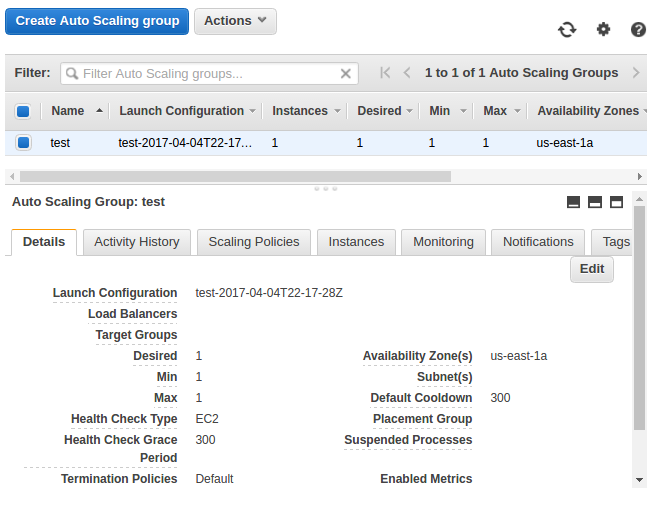
Launch configuration:
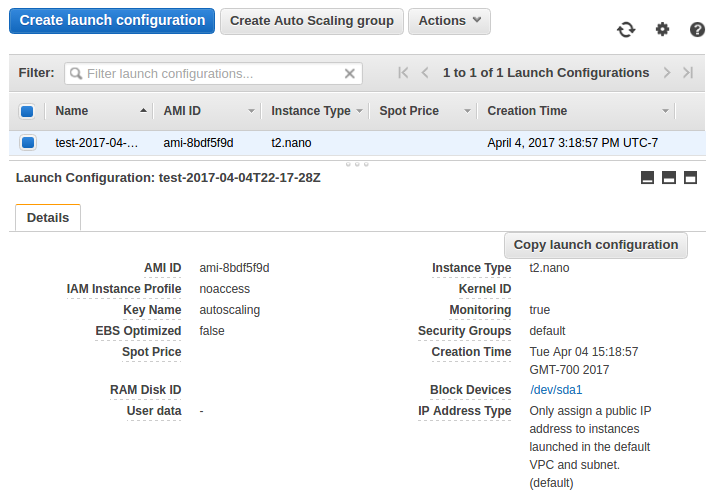
We can see we have a new instance (test) and a deleted amibuild (testamibuild) instance:

Immutable Infrastructure with AWS and Ansible - Part 3 - Autoscaling
Ansible 2.0
Ph.D. / Golden Gate Ave, San Francisco / Seoul National Univ / Carnegie Mellon / UC Berkeley / DevOps / Deep Learning / Visualization